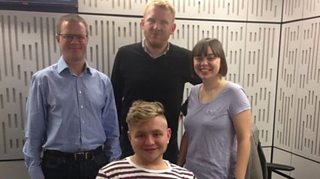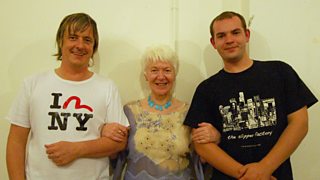Cripple Punk: the disability movement taking on ‘inspiration porn’
19 November 2018
In late 2014, an American blogger known as Tyler posted an image on their social media feed of themselves outside a diner. In one hand, a cigarette; in the other, their walking stick.
The heading read ‘Cripple Punk’; the caption underneath, ‘I’m starting a movement’.
As with many posts on social media, however, some people were opposed to the sentiments surrounding Tyler’s photo — and responded with their own far-from-enlightened comments, seemingly against the idea of whatever concept they thought ‘Cripple Punk’ might represent.
So Tyler decided to use the trolls’ hate-filled comments as inspiration to justify the movement and create a manifesto for it.
Word spread through the Cripple Punk blog. What had started out as a bit of fun had suddenly grown into a real movement — one Tyler felt was required for disabled people.
Inspiration porn
One of the main things Cripple Punk aims to strike out against is the ‘Good Cripple Mythos’: the polarising idea that physically disabled people are either inspirational or to be pitied.
Indeed, the term ‘inspiration porn’ was coined to capture the idea that disabled people are seen as ‘inspirational’ purely because they have a disability, rather than because of their actions.
For followers of Cripple Punk, not all disabled people are inspirational: most have the same character traits and flaws as any able-bodied person.
-
![]()
Tanni Grey-Thompson: ‘Disabled people are just people’
The former paralympian says not every disabled person has faced adversity.
Jessica and Cripple Punk
The Social contributor Jessica agrees that disabled people can’t all be seen as being inspirational.

“I’m physically disabled. I’ve got a connective tissue disease, a straight spine and Raynaud’s. But we’re human. We can smoke, drink. We can be imperfect. We don’t have to fit people’s expectations.”
Being seen as a real person – not an idealised, inspirational figure for able-bodied people – is something with which Jessica feels Cripple Punk helps disabled people.
“Cripple Punk came into my life and made me feel I wasn’t worthless, that I mattered.”
Jessica’s joy at finding the movement is also tempered with slight sadness.
“I found out that Tyler had passed away [in 2017]. I’ll never be able to thank them in person for how much they impacted my life for the better.”
Challenging the idea that you’re ‘inspirational’
Latest features from ´óÏó´«Ã½ Scotland
-
![]()
'Wild swimming helps me process the grief of losing my son'
The benefits of cold water therapy.
-
![]()
Winter adventures are appealing, but an expert advises caution
Trips in winter require particular knowledge and skills.
-
![]()
The rescuers: Why volunteers risk their lives in mountain emergencies
Landward meets members of the Cairngorm Mountain Rescue Team.
-
![]()
‘Look for the light’ – practical tips to help you through another winter with SAD
Useful advice and tips to combat low moods at this time of year.
-
![]()
How you could be a binge drinker without even knowing
Binge drinking is classed as fewer units than many people may realise.
-
![]()
How chocolate biscuits and drama classes helped one man leave prison behind
The healing power of creativity.
-
![]()
'When people believe in you, it’s life-changing'
Author Graeme Armstrong revisits the man who helped turn his life around.
-
![]()
The 'breath-taking' display of US birds swept on to British soil
Recent storms have brought rare birds to our shores.
-
![]()
Six things we learned about Alan Cumming on Take the Floor (Spoiler: includes accordions)
The actor spoke to Take the Floor's Gary Innes.
-
![]()
How street gangs trap young men in a dangerous cycle of violence
The almost inescapable pull of life in a gang.
-
![]()
Why stylist Gok Wan believes there's no such thing as bad fashion
The fashion expert says we should stop following rules and do what feels right.
-
![]()
Is sending a CV still the right way to apply for a job?
They've been central to job applications for years, but are they worth it?




















